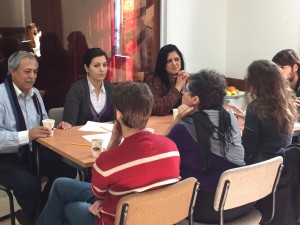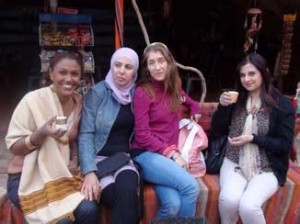Since 1993, we hold project, meetings, and partnerships between Palestinians from the Palestinian Authority to Israeli, with the aim of strengthening the peace process between the two nations. To this day thousands of Palestinians and Israelis have participated in our activities. Throughout the years we built relations with Palestinian peace organizations and together held various programs the center of which were meetings and training courses. The emphasis of our work changed in recent years from dialogue which creates change in awareness to dialogue which leads to activism and changing the reality. The first step of dialogue is personal and political introductions, including a peace negotiations simulation. Our various programs offer meetings mainly to professionals from different fields.
Training Change Agents
The flagship program of the School for Peace is a training program for change agents for professionals from different fields. Over the years we trained lawyers, mental health professionals, journalists, environmentalists, professionals from human rights and social change organizations, leaders in mixed cities, literature and history teachers, urban planners and architects, physicians, politicians and more.
professionals from different fields. Over the years we trained lawyers, mental health professionals, journalists, environmentalists, professionals from human rights and social change organizations, leaders in mixed cities, literature and history teachers, urban planners and architects, physicians, politicians and more.
The aim of this program is to create real dialogue between participants which deals with their field of work and daily work life, by looking at the conflict, and dealing with the social and political issues which they face. In addition, the program aims to influence decision-makers in their daily work, and to create shared or uni-national activism to change the socio-political reality.
The program allows examining of identities and the role each person takes in preserving and changing relations. During the program the participants receive tools to deal with these topics at work and in their professional community. In the future we intend on opening courses for filmmakers, archaeologists, and lawyers.
Training Facilitators
The School for Peace trains facilitators based on our unique method. The course focuses on the Jewish-Arab conflict, and for many years it was the only such course in Israel. Most of the professionals in the field today are graduates of the School for Peace. The course opens once a year for a group of twenty Jews and Arabs and includes dialogue and practicum.
In the practicum the participants practice facilitation with their peers and an instructor. The course includes lectures on group facilitation theories, theories on social identity, theories on development of ethnic and racial identities, Paulo Freire’s writings, and post-colonial theories. In addition, the participants learn issues specific to facilitating groups in conflict, such as facilitating in a Jewish-Arab duo, the language’s place in dialogue, the uni-national framework and more. Up until 2017, we trained over 1000 facilitators, Jews and Palestinians in Israel and Palestine.
Academic Courses
The senior staff of the School for Peace teaches courses dealing with the Jewish-Arab conflict, in cooperation with several universities, since 1991. The aim of these courses is to allow learning of processes characteristic of groups in conflict, through the Jewish-Arab conflict, and to connect between the material created from the dialogue in the course to the student’s field of study (education, social psychology, social work and more).
The courses are full academic courses and in the most part are practical and experiential. They are taught by two facilitators from the School for Peace, one Jewish, on Arab, and guest lecturers. Once a year we hold a conference in Wahat Al-Salam ~ Neve Shalom for participants of these parallel courses.
The universities which currently have SFP courses are: Tel Aviv University (since 1990), Haifa University, Ben Gurion University, Ruppin Academic College and the Arabah Institute.
Programs for Women
The School for Peace holds various programs for women with the aim of empowering them and deepening their knowledge and understanding of the connection between gender-based oppression and nation-based oppression. The programs include courses and dialogue in different shared frameworks for Jewish and Arab women, and in uni-national frameworks.
deepening their knowledge and understanding of the connection between gender-based oppression and nation-based oppression. The programs include courses and dialogue in different shared frameworks for Jewish and Arab women, and in uni-national frameworks.
These programs include: women leadership for promoting Jewish-Arab relations in mixed cities, workshops dealing with feminism and nationality, dialogue meetings across the border, facilitators training courses, courses for training journalists to promote conflict-sensitive media, and more.
Programs for Teenagers
The programs for teenagers are the longest-running and are ongoing since the founding of the School for Peace. The activity is directed at senior high-school students in schools inside Israel, and centers around three-day dialogue meetings in Wahat Al-Salam ~ Neve Shalom. Each cohort brings together thirty students from each national group who chose to try dialogue with the peers from the other nation. The program includes personal introductions, discussions on culture and political discussions. Most of the activity is conducted in small mixed groups, with two facilitators, one Jewish, one Arab. The workshops also include a simulation of negotiations on the relations between Jews and Arabs in the country. The simulation game is managed by the participants themselves and includes an attempt to put into writing shared principles for equal life between the participants. A large part of the workshop is dedicated to direct dialogue in uni-national and bi-national groups.
Conferences
The School for Peace conducts conferences on issues central to the relations between the two peoples and the conflict with the aim of creating a public discourse which will promote equality and peace between the two nations.
